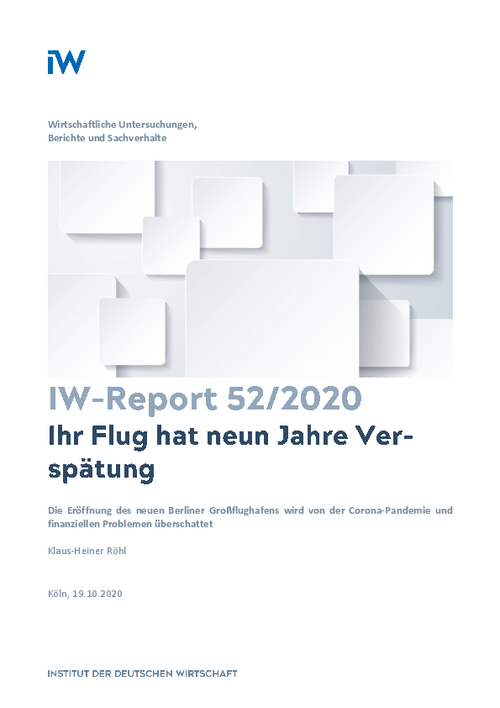Only four weeks before the planned date in June 2012, the opening of Berlin's major airport BER, which had already been postponed from fall 2011, was canceled. This was followed by years of announcements, ever new lists of construction deficiencies and further delays.

Your Flight has a Nine Year Delay: The Opening of Berlin's New Major Airport is Overshadowed by the Corona Pandemic and Financial Problems
IW-Report

Only four weeks before the planned date in June 2012, the opening of Berlin's major airport BER, which had already been postponed from fall 2011, was canceled. This was followed by years of announcements, ever new lists of construction deficiencies and further delays.
On October 31st 2020, the chaos of construction and planning that has damaged the reputation of German engineering in the world seems to come to an end: The new airport is finished and can be opened. The economy of the capital region should benefit from the new infrastructure, with the Brandenburg region around it already booming before opening of the airport. From 2012 to 2019, the number of passengers in Berlin grew by 41 per cent to 35.6 million, so that the new major airport was heading for a take-off under full load at the beginning of the year. But with the Covid 19 pandemic, air traffic has collapsed and the already difficult financial situation of the mega-project, which has cost 6.5 billion euros until now, threatens to get out of hand. In the books of the airport company, its infrastructure is worth about 5 billion euros - but it is unlikely to be worth much more than half that amount. A recapitalization by the shareholders seems inevitable. The involvement of private investors is possible, but also requires a prior correction of the financial imbalance.

Klaus-Heiner Röhl: Ihr Flug hat neun Jahre Verspätung – Die Eröffnung des neuen Berliner Großflughafens wird von der Corona-Pandemie überschattet
IW-Report

More on the topic

Compendium 5.4: CO2 Regulation of Road Transport in Europe
With the Compendium CO2 Regulation in Europe, the IW has been providing the interested public with a comprehensive collection of data on the development of CO2 emissions from passenger car traffic in the European Union, as well as on the applicable regulatory ...
IW
The Transformation of the Automotive Industry: An International Comparison of Germany's Innovation Performance
The automotive industry is undergoing a comprehensive technological transformation that is challenging established value chains. Making sure that domestic research helps to shape this ongoing transformation is therefore an important task for countries with a ...
IW